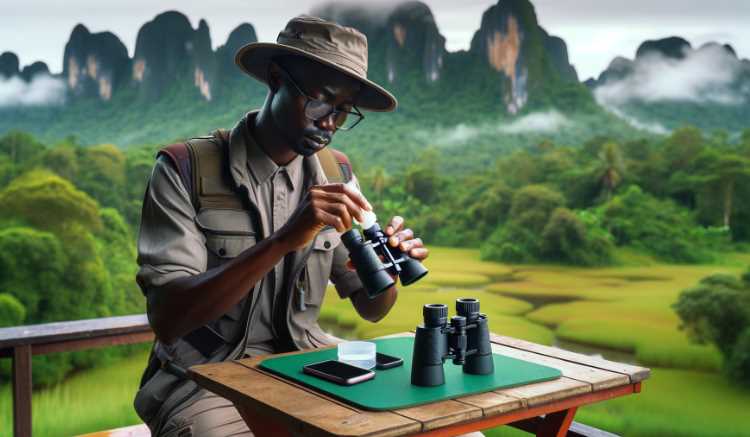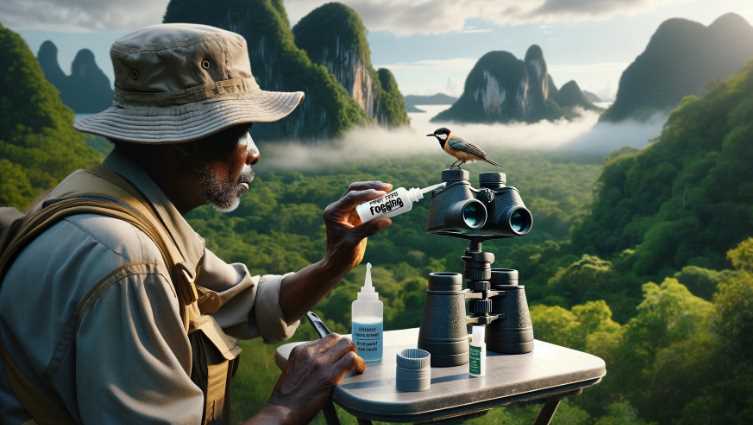To prevent binoculars from fogging, store them in an airtight container with desiccant packets, keep them at ambient temperature, and avoid sudden temperature changes. Additionally, use an anti-fogging solution on the lenses.
Binoculars can fog up when warm, moist air comes into contact with the cold lenses, causing condensation. To prevent this, follow these steps:
- Airtight Storage: Store your binoculars in an airtight container when not in use. This reduces exposure to humid air and helps maintain a stable environment.
- Desiccant Packets: Place desiccant packets, such as silica gel, in the container to absorb moisture. This further prevents the formation of condensation inside the binoculars.
- Temperature Control: Keep the binoculars at ambient temperature. Avoid exposing them to extreme temperature variations, as this can lead to condensation.
- Anti-Fogging Solution: Apply an anti-fogging solution to the lenses. These solutions create a protective barrier, reducing the likelihood of fogging.
No products found.

| Preventive Measures | Description |
|---|---|
| Airtight Storage | Store binoculars in an airtight container to minimize exposure to humid air. |
| Desiccant Packets | Place desiccant packets (e.g., silica gel) in the container to absorb moisture. |
| Temperature Control | Keep binoculars at ambient temperature and avoid sudden temperature changes. |
| Anti-Fogging Solution | Apply an anti-fogging solution to the lenses to create a protective barrier against condensation. |
Here are three solutions to help prevent fogging and make your binocular usage more efficient.
Binoculars can be a great addition to your outdoor gear, but they can also be challenging to keep clean. In humid climates, fog can form on the lenses, obscuring your view. To prevent this from happening, follow these tips:
1. Ensure the binoculars are kept in a cool and dry environment.
2. Check the lenses for any signs of condensation or moisture.
3. Clean the lenses with a lens cleaner, soft cloth, or tissue paper.
4. Remove any foggy material using a lense scraper.
5. Re-fit the lenses and check that they are clear.
6. If the lenses need to be replaced, choose a fog-proof and waterproof pair.
Why Do My Binoculars Get Foggy?

Binoculars can get foggy because of the way they work. When you look through the binoculars, you are using your peripheral vision to see things close to you. This is different from what your eyes normally do, focusing on one object at a time.
When your eyes and binoculars focus on the same object, it creates much pressure in the eyeglasses vein. This pressure causes the liquid to form in these areas and creates fog. If you continue looking through the binoculars while this fog is still present, it will become even more severe and may even obscure your vision completely.
Outside Fogging
Binoculars can get foggy when you’re using them outdoors because of external factors like air temperature and humidity. When these conditions are right, moisture in the air condenses on the lenses of the binoculars. This can cause much frustration because it makes it difficult to see clearly.
There are a few things that you can do to combat this problem. One is to keep your binoculars as dry as possible. You can also try storing them in an area where the temperature and humidity are controlled or use a lens cloth to clean them before use. In extreme cases, you may need to replace your binoculars.
Six ways to prevent binoculars from Outside Fogging
1. Protect lenses from extreme weather conditions
Binoculars are a great way to see things from a distance, but they can be problematic if they’re used outdoors.
One of the biggest problems with binoculars is that they can get fogged up very quickly in warm weather. This happens because the air inside the binoculars is warmer than the air outside, and this causes condensation to form on the lenses. This then obscures your view and makes it difficult to see what’s happening around you.
To prevent this from happening, you need to make sure that your glasses adjust to the outdoor climate. For example, if you live in a hot climate, your glasses should be thick to resist heat and clear your vision.
2. Alternating Handling Performances
You need to change a few handling techniques to prevent binoculars from fogging up outside.
The most common way binoculars fog up is when the lenses get wet. This happens because the water droplets in the air condense on the lens and create a thick layer of fog. To prevent this from happening, you need to avoid getting your hands wet and make sure that you dry your lenses properly after using them.
You can also reduce the amount of fogging by keeping your binoculars clean. Dirty lenses cause more water droplets, which then combine and form thicker layers of fog. To keep them clean, wipe them down with a cloth or sponge after each use. Finally, ensure your storage container is dry and free from dust or other pollutants before storing your binoculars.
3. Use a fog-free lens cloth.
One common problem with binoculars is that they can become foggy and unusable due to exposure to the elements. To prevent this, you can use a microfiber cloth to clean them regularly. This will help remove any dirt, dust, or debris causing the glasses to fog up.
4. Keep it in a cool and dry place.
Another way to prevent binoculars from becoming foggy is to keep them in a cool and dry place. If you live in a humid area, you may want to invest in a humidity absorber for your binocular case. This will help reduce the amount of moisture inside the case, reducing the amount of fogging.
5. Use An Anti-Fog Agent
You can use an anti-fog agent to keep them clean and free from fog. This will ensure that you can see clearly as you explore the world.
A few anti-fog agents are available on the market, but the most common is DeOxit. It works by breaking down water molecules in the air, which then reduces fogging. It’s easy to apply, and it just needs to be applied once every month or two. You can also use it on your glasses if they get foggy.
Overall, using an anti-fog agent is a great way to keep your binoculars working perfectly and give you a clear view of the world.
6. Keep the eyecups clean and dry.
It is important to keep the eyecups of your binoculars clean and dry to prevent them from fogging up. To do this, you’ll need to follow these steps:
– Clean the eyecups with a cloth or a brush every time you use them.
– Avoid using harsh chemicals or cleaning products on the eyecups, as they can damage them.
– Keep the eyecups dry by storing them in a dry place.
Inside Fogging
Binoculars can become fogged up from internal condensation, which results from the moisture inside the binoculars combining with the air. This moisture forms droplets that slowly roll around and accumulate inside the lenses.
Eventually, this accumulation can lead to a complete blockage of the lens, which will cause you to lose your vision. In extreme cases, you may even need surgery to remove the fogged-up lenses.
To prevent this from happening, keep your binoculars stored in a cool and dry place where the temperature stays below 60 degrees Fahrenheit. Also, clean them regularly using a mild soap and water solution.
Four ways to prevent binoculars from inside Fogging
1. Avoid using binoculars near water.
Binoculars can be a great way to get a closer look at things, but you must be careful not to use them near water. This is because the lenses inside binoculars are very sensitive to moisture, and if they come into contact with water, they will quickly start to fog up. This can make it difficult to clearly see what you’re looking at and lead to problems like blurry images and distorted views.
If you need to use your binoculars near water, make sure that you keep them dry by storing them in a dry place or taking them outside only when the weather is clear, and the sun is shining. And always remember to avoid shaking them or putting them in direct sunlight — this will only make the lenses foggy.
2. Using Water & Fogproof Binoculars
The best way to prevent your inside lenses from fogging up is to buy fogproof binoculars. These glasses have special coatings that protect the lenses from moisture and humidity, preventing them from fogging. Fogproof binoculars are also designed to keep the eyes dry so that you can see even in wet and humid conditions.
3. Using Proper Desiccant
A desiccant is a substance that removes moisture from the air. When binoculars are kept in a humid environment, the water inside them condense and form fog. By using a desiccant, you’ll be able to eliminate this moisture and prevent fog development.
Several types of desiccants work best for different applications. One type of desiccant is called a humectant, which absorbs water vapor and turns it into liquid droplets. This type of desiccant is effective at removing moisture from the air. It is usually used in high-humidity areas (like an office) because it’s easy to refill the container.
Another type of desiccant is absorbent, which adsorbs water on its surface. This type of desiccant is good for removing moisture from smaller areas like binocular lenses or computers because it has a greater capacity to hold onto water molecules. It also prevents dust particles from becoming airborne and causing allergies.
4. Use a humidifier
If you’re using binoculars outdoors, keep them fog-free by using a humidifier. This is especially important if you plan on spending much time in the field.
Binoculars collect tiny water droplets from the air and condense them onto the lenses. This causes visibility to be reduced because the lens can’t correctly transmit light. A humidifier can help prevent this issue by adding moisture to the air, reducing the amount of fogging.
5. Seal the lenses with a clear plastic or metal sealant
One way to prevent binoculars from fogging inside is to seal the lenses with a clear plastic or metal sealant. This will prevent the air inside the binoculars from becoming foggy and keep the lenses clean.
Sealing the lenses is especially important in cold weather because condensation can form inside the lens and cause blurred vision. By sealing the lens, you’ll prevent this from happening.
How often should I clean my binoculars?
Depending on your binocular type, you may need to clean them more or less frequently. On average, regular eyeshadow and fingerprints can be cleaned with a mild soap and water solution every week or two. Lenses should be dried quickly after being washed by wiping them down with a dry cloth or air-drying.
And finally, avoid using harsh chemicals like eyewash solutions, solvents, or abrasives when cleaning your optics because they could damage the lenses over time.
Can I use a screen protector with my binoculars?
While it is possible to use a screen protector with your binoculars, care should be taken to ensure that the protective layer doesn’t impact the functions of the binoculars. It is also essential to avoid using any adhesive-type films that may impair vision. Instead, choose a film made from transparent or semi-transparent material that will not interfere with visibility.
To achieve optimum results, always test out each screen protector before installing it on your device for the first time. In addition, make sure to clean your binoculars after every use and store them in a dry and dust-free environment.
Can I use Binoculars in cold weather?
Yes, if the lenses are protected, you can use binoculars in cold weather. Many manufacturers now include a special coating that helps to prevent fogging and decrease the chances of eyestrain. Be sure to adjust your viewing position regularly so that you don’t have blurry vision. And remember to bring extra batteries if necessary!
Final Words
In the end, this time, you got through with binoculars and didn’t have to worry about smudging your lenses. Suppose you encounter another similar situation where your lenses get foggy after using the binoculars for a while. In that case, we suggest one more thing – carrying around BulbHead Anti-Fog Lens Spray.
We recommend it because it works accurately and quickly. With just a few sprays on both sides of the lens, this anti-fog spray can keep your eyes clear for long use! You can also conveniently store it in your pockets when not in use to mitigate any mishaps like that again.

I am an enthusiastic student of optics, so I may be biased when I say that optics is one of the most critical fields. It doesn’t matter what type of optics you are talking about – optics for astronomy, medicine, engineering, or pleasure – all types are essential.
Last update on 2025-07-19 / Affiliate links / Images from Amazon Product Advertising API
Table of Contents

Pingback: Why Do Binoculars Have Red Lenses